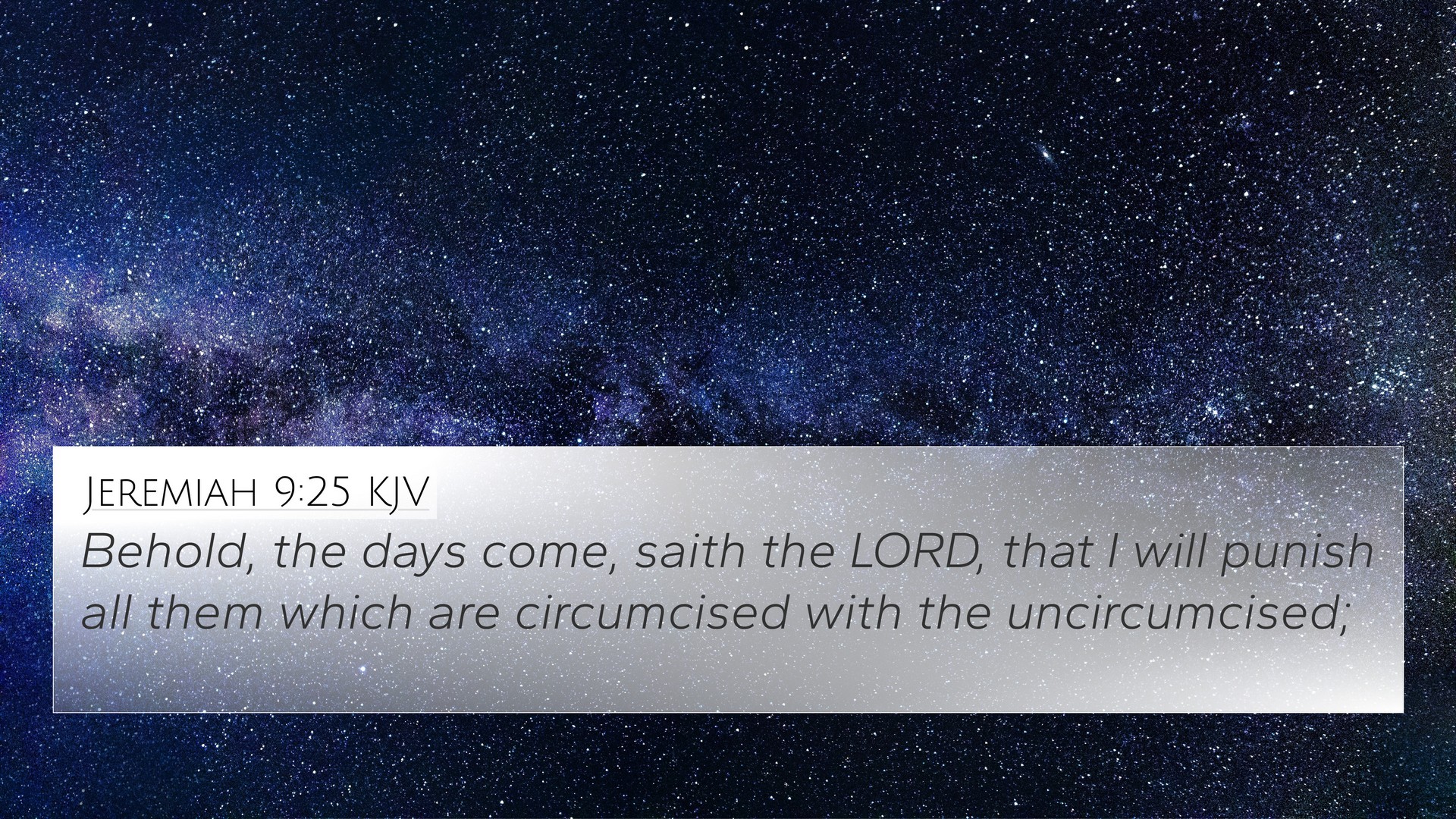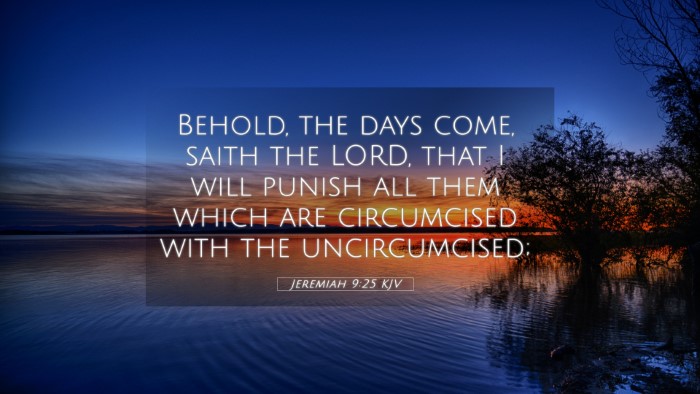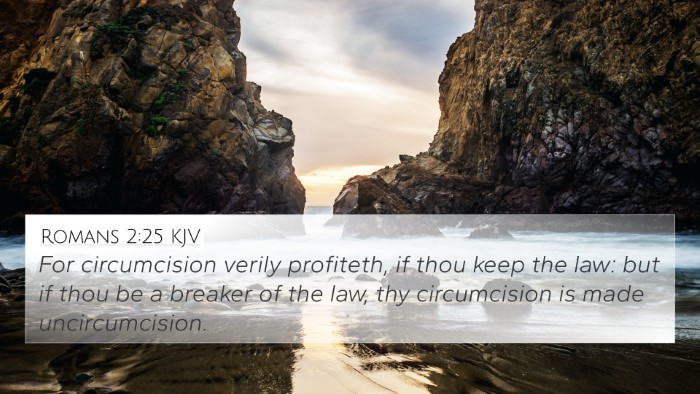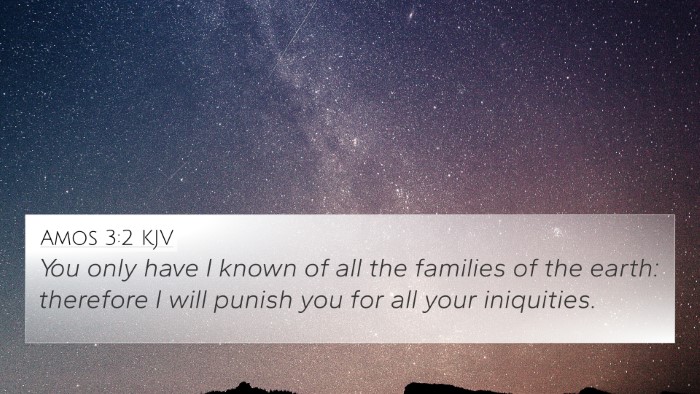Understanding Jeremiah 9:25
Jeremiah 9:25 (KJV): "Behold, the days come, saith the LORD, that I will punish all them which are circumcised with the uncircumcised."
This verse from the Book of Jeremiah is a profound message reflecting God’s intention to address both the Israelites and the surrounding nations. It serves as a reminder of the divine judgment that transcends physical symbols of faith, such as circumcision.
Summary of Interpretative Insights
This interpretation draws from the insights of renowned commentaries, including those by Matthew Henry, Albert Barnes, and Adam Clarke. The collective understanding from these sources sheds light on the significance of Jeremiah 9:25.
Main Themes
- Divine Judgment: The passage emphasizes God's impending judgment on all nations, including those who are circumcised (the Israelites) and those who are not (the Gentiles). This signifies that God’s standards are not merely based on outward appearances but on the faith and integrity of one’s heart.
- All-encompassing Nature of God's Justice: The verse underscores that God's justice is impartial, as it affects both the covenant people and the gentile nations. This highlights the universality of God's sovereign authority.
- Spiritual vs. Physical Identity: The reference to circumcision symbolizes the distinction between God’s chosen people and the rest of the world. Yet, this passage calls into question the idea that physical lineage or rituals alone can secure God's favor.
Detailed Analysis of Key Concepts
1. Divine Judgment: Matthew Henry articulates that God’s judgment is coming upon those who have obeyed the covenant externally but have failed to adhere to it in their hearts. This judgment is comprehensive and highlights a looming retribution on both Israel and the surrounding nations, communicating that external symbols of faith such as circumcision do not guarantee righteousness before God.
2. The Significance of Circumcision: Adam Clarke notes that circumcision was a sign of the covenant between God and Israel, symbolizing their special status. Yet, the mention of “circumcised with the uncircumcised” suggests a need for accountability and indicates that simply having the mark does not exempt one from God's judgment.
3. The Universality of God’s Standard: Albert Barnes emphasizes that true righteousness comes from within. The juxtaposition of the circumcised and uncircumcised challenges the notion of superiority based on heritage or ritual practices, urging a reflection on authentic faith and repentance.
Bible Verse Cross-References
This verse can be enriched through various cross-references in the Bible that connect to its themes. Consider the following:
- Romans 2:28-29: Addresses true circumcision of the heart, aligning closely with the message in Jeremiah.
- Isaiah 52:1: Calls upon Jerusalem to be cleansed, echoing the theme of divine judgment and purification.
- Revelation 21:8: Speaks of God's judgment as including all, regardless of their prior claims of faith or lineage.
- Galatians 5:2-6: Discusses circumcision in the context of faith and grace, reinforcing the notion that it is faith that justifies, not adherence to the law.
- Deuteronomy 10:16: Commands the Israelites to circumcise their hearts, an idea that harmonizes with the message of inward sincerity before God.
- Matthew 3:9-10: Where John the Baptist warns the Pharisees and Sadducees about claiming their lineage as a means of escape from God’s judgment.
- Ezekiel 18:30: Urges Israel to repent and turn from all offenses, paralleling the theme of internal transformation versus external ritual.
Exploring Connections Between Bible Verses
In conducting a comprehensive Bible cross-reference study, the connections between Jeremiah 9:25 and other scriptures reveal an essential theme in God’s character—His desire for a genuine, transformative relationship with His people regardless of external indicators of faith.
Tools for Bible Cross-Referencing
To enhance your understanding further, consider employing the following tools:
- Bible Concordance: Helps find specific terms and their occurrences throughout the scripture.
- Bible Cross-Reference Guide: Provides structured paths to see thematic and contextual links across different passages.
Cross-Referencing Biblical Texts
By using a systematic Bible cross-reference system, one can explore similarities between the Old Testament prophets and the teachings in the New Testament, creating a richer understanding of scripture.
Conclusion
Jeremiah 9:25 serves as a powerful reminder of God’s impartial justice. It draws attention to the essential need for genuine faith over mere outward symbols. By engaging with inter-biblical dialogue through systematic cross-referencing, one not only deepens their understanding of individual passages but also sees the broader narrative woven throughout scripture. This verse challenges believers to examine their hearts and strive for authenticity in their faith.








